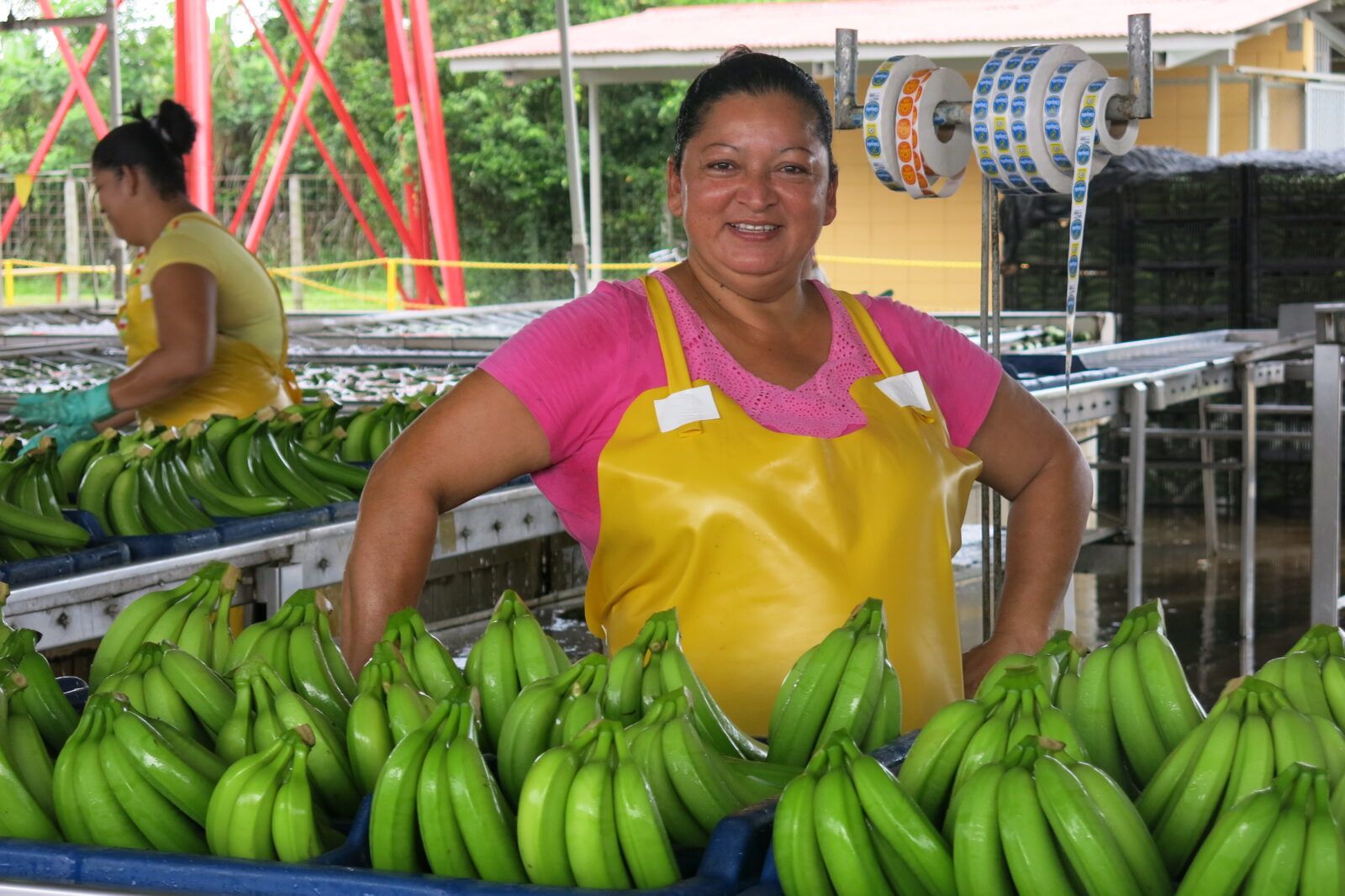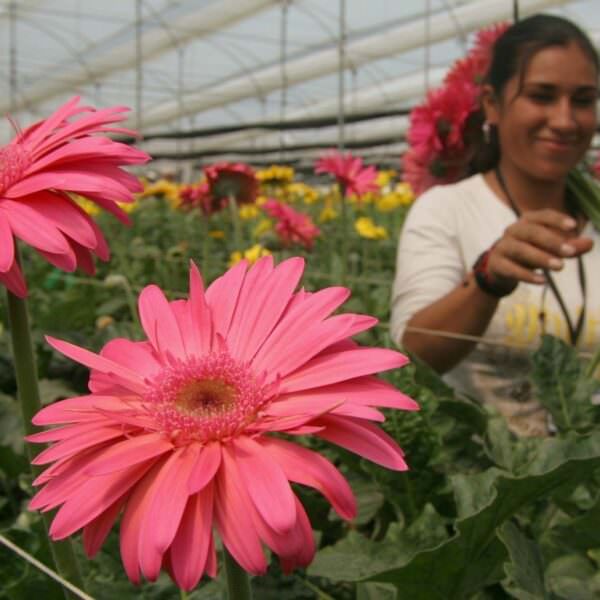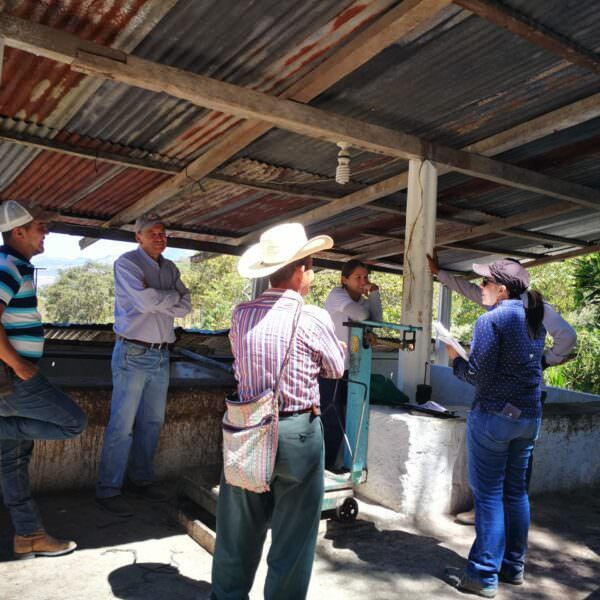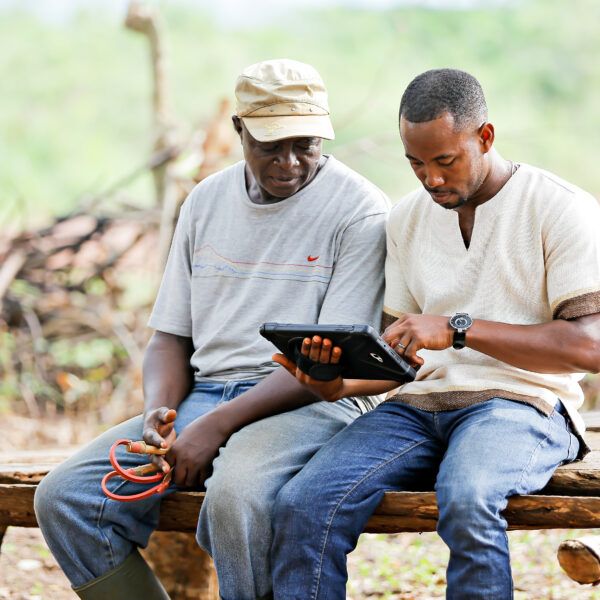At the Rainforest Alliance, we are constantly striving to offer more value to the thousands of farmers and companies around the world who use certification to drive more sustainable agriculture and equitable supply chains. For this reason the Rainforest Alliance 2020 Certification Program has many innovative new features—from our shared responsibility approach to a model of continuous improvement. It took years of hard work and collaboration to get us here. Before publishing the 2020 Sustainable Agriculture Standard in June, we held two separate rounds of public consultations online with over 1,000 people in 50 countries, incorporating input from the field to the boardroom.
As we roll out the new program, we continue to engage in dialogue with our partners to make the standard even more practical and flexible to different contexts and to ensure a smooth implementation and transition from previous standards. The new program aims to strengthen the quality of implementation and enable buying companies to provide additional support for farmers in implementing the standard requirements. In addition, we are gathering feedback from our pilots with early implementers of the 2020 Certification Program, and so far, their response has been generally positive.
Discussions and pilots with the banana sector
TECHNICAL MEETINGS
Since the publication of the 2020 Certification Program, we have held more than 15 technical meetings with many participants from banana sector organizations and farms. These meetings have given us the opportunity to have constructive discussions on key elements of the Sustainable Agriculture Standard. Our goal is to ensure that banana growers around the world are using the full power of the standard so that together we can maximize the positive social, environmental, and economic impact.
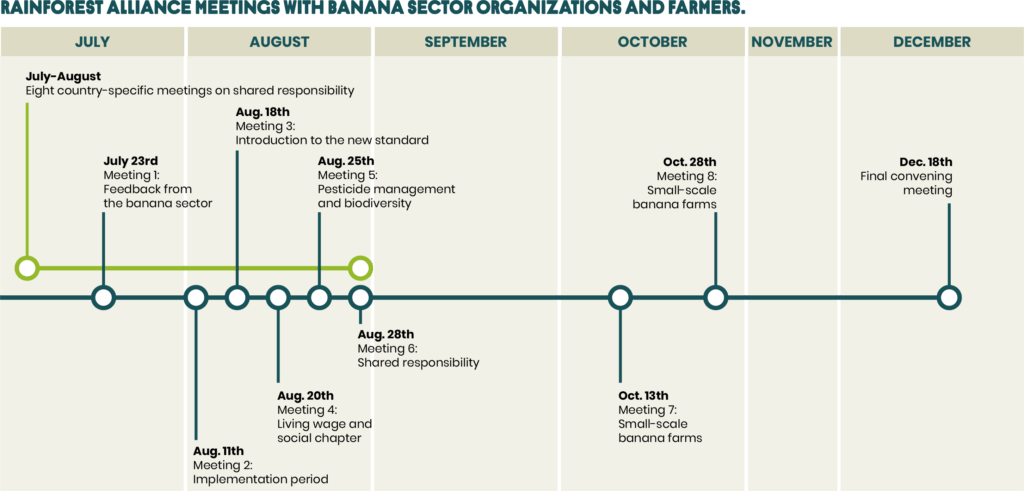
- We held the first meeting in July 2020. The Rainforest Alliance core banana team and members of its leadership team held an open discussion with sector organizations from Costa Rica, Colombia, Guatemala, Honduras, and Ecuador. We followed this with four technical meetings in July and August, as well as eight country-specific meetings on shared responsibility.
- The Rainforest Alliance has also conducted several meetings with smallholder banana farmers to help with the implementation of the new standard—with a focus on the requirements specific to individual situations.
- The convening meeting at the end of December 2020 concluded this round of discussions, which included Rainforest Alliance leadership and Board Chair. In this meeting, the Rainforest Alliance confirmed the sustainability ambitions behind its new standard. The Rainforest Alliance summarized the actions taken, which were based on the feedback from the sector and again invited banana farmers and companies to implement the standard together.
PILOTS AND TRAININGS
In the first quarter of 2021, the Rainforest Alliance is planning to run several pilots with international retailers to see how the shared responsibility approach works in practice and to adjust the guidance and trainings accordingly. The Rainforest Alliance invites banana farmers to participate in these pilots and provide input in order to ensure smooth implementation.
Furthermore, the trainings of current certificate holders and potential new members in Latin America will start in January 2021 (see this page for more details on how to get training in different regions).
Actions taken by the Rainforest Alliance based on feedback
Every piece of feedback we receive helps us make the program better. Based on the feedback from the banana sector, the Rainforest Alliance identified 39 action points. By the end of December 2020, we completed 24 of these actions. We will incorporate these improvements in the guidance documents and version 1.1 of the new standard (published early 2021). The other actions are being implemented or have led to a few invitations for the banana sector to provide further input.
The Rainforest Alliance has also adapted timelines to support implementation for banana farms and companies, for example:
- Banana farms were granted 18 months from July 1, 2021 to implement the new standard, based on the very clear request from the banana sector organizations to allow for the entirety of 2022 to implement the new standard.
- We moved deadline for implementing the shared responsibility chapter of the standard to the first contract cycle after July 2021 (to align it with general timelines for making new contracts in the banana sector).
Additionally, we are currently collecting input for guidance documents on:
- Shared responsibility (published in the first quarter of 2021)
- Energy use (published by December 2020)
- Integrated Pest Management (published by December 2020)
Moving forward
In the weeks and months ahead, the Rainforest Alliance invites banana farmers and companies to:
- Participate in a workshop in Q1 2021 to discuss requests for exceptional use of pesticides and implementation challenges before publication of our ‘exceptional use’ policy.
- Provide feedback on the new Annex 13 (published in January 2021) which will explain how to contribute towards conservation and restoration areas outside farm boundaries–to comply with the 10% natural vegetation cover requirement.
- Provide input and feedback for revising drone requirements around aerial application of pesticides to ensure safe spraying.
- Participate in our pilots on shared responsibility approach starting in Q1 2021.
- Take part in the trainings on the new standard starting in January 2021.
By coming together in an open discussion, we can have a positive impact on the sustainability of banana farms and the livelihoods of banana growers around the world. We remain committed to the continuous improvement of our certification program to drive real change on the ground—in collaboration with farmers, companies, and other members of our alliance.
Read more in the statement from the Rainforest Alliance inviting banana sector to join our ambitious, new certification program.
